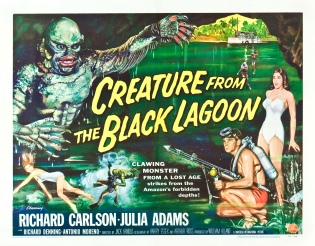This is the first in the series of reviews I will post over the next two months of the 5 collections chosen for the 2018 Forward Prizes Felix Dennis award for best First Collection. The £5000 prize will be decided on 18th September 2018. Click on this link to access all 5 of my reviews of the 2017 shortlisted books (eventual winner Ocean Vuong) and here for my reviews of the 2016 shortlisted books (eventual winner Tiphanie Yanique) and here for my reviews of the 2015 shortlisted books (eventual winner Mona Arshi).
The full 2018 shortlist is:
Kaveh Akbar – Calling a Wolf a Wolf (Penguin UK)
Abigail Parry – Jinx (Bloodaxe Books)
Phoebe Power – Shrines of Upper Austria (Carcanet)
Shivanee Ramlochan – Everyone Knows I Am a Haunting (Peepal Tree Press)
Richard Scott – Soho (Faber & Faber)

Jinx stands out for its level of vigorous inventiveness which emerges as rapid-fire, Raine-like, Martianesque figurative language on the micro level and a fecund spawning of memorable characters such as Mr Chop, Spook, the Jewel Thief, Geraldine, the Goatman and the Courtesan Jigoku Dayu. Parry also likes to experiment with form, though thankfully she steers clear of the current modish favourite, the prose-poem. In fact, she’s a poet’s poet evidently passionately in love with words (their sounds as much as meaning) and her use of rhythm and line is always – again this word is best fit – vigorous. The poem I repeatedly hear behind Jinx is Sylvia Plath’s ‘Daddy’ as much for its repetitions, its inventiveness of image (remember “Marble-heavy, a bag full of God, / Ghastly statue with one gray toe / Big as a Frisco seal”) and its tonal muscularity as its sexual politics. Surprisingly, Parry’s book’s focus is fairly narrow: male/female relationships, the fragility of the self and self-knowledge, the equivocal power of words (for truth or falsehood).

All these elements feature in the book’s opener and Jane Austen tribute poem, ‘Emma, you’re a gamer’. Austen’s heroine’s often skilled gaming/manipulation of situations is celebrated in listy short phrases: “Emma, you’re a dreamer. You’re a strategist, a schemer – / the metagame of manners, / all those formal misdemeanours, / the compliments, charades. / Emma, you’re a charmer.” Both rhythm and rhyme carry an energetic admiration for the skilled player though the poem records her eventual defeat (in the games of “amore [. . .] same old story”). Her climb-down, self-recognition and accusation in the face of Mr Knightley concludes the poem: “Give it up now, little ego, / there’s a prize for second place, / and Emma, you’re an amateur, you’re up against a pro”. Parry’s poem adds little to our response to Austen’s book, though the up-dated lexis yields some increase in accessibility. The poem’s life is in its verbal vigour especially because Emma is seen from such a distance by an amused, disengaged narrator who can use a phrase like “same old story” and leave it at that. It’s a good poem, even a likely anthology choice, but Parry is much better when she pours more emotional petrol onto her linguistic flames.
 Mr Knightley is an absent figure in that poem, but Jinx is repeatedly visited by powerful, seductive, dangerous males who – in ways now very familiar since Angela Carter started the ball rolling – are morphed into animal figures. ‘Hare’ is an early example, leaning invasively over the female narrator at a wedding party, “those fine ears folded smooth down his back, / complacent. Smug. Buck-sure”. As in ‘Daddy’, the woman is drawn to the man despite (or because of) his obvious threat but unlike Plath’s powerful final repulse (“Daddy, daddy, you bastard, I’m through”), Parry’s narrator is fatalistic: “Your part is fixed: // a virgin going down, / a widow coming back”. Elsewhere, ‘Goat’ and ‘Magpie as gambler’ work similarly and ‘Ravens’ is a particularly Plathian version: “In fact, every man I thought was you / had a bird at his back / and a black one too”.
Mr Knightley is an absent figure in that poem, but Jinx is repeatedly visited by powerful, seductive, dangerous males who – in ways now very familiar since Angela Carter started the ball rolling – are morphed into animal figures. ‘Hare’ is an early example, leaning invasively over the female narrator at a wedding party, “those fine ears folded smooth down his back, / complacent. Smug. Buck-sure”. As in ‘Daddy’, the woman is drawn to the man despite (or because of) his obvious threat but unlike Plath’s powerful final repulse (“Daddy, daddy, you bastard, I’m through”), Parry’s narrator is fatalistic: “Your part is fixed: // a virgin going down, / a widow coming back”. Elsewhere, ‘Goat’ and ‘Magpie as gambler’ work similarly and ‘Ravens’ is a particularly Plathian version: “In fact, every man I thought was you / had a bird at his back / and a black one too”.
 For all the frenetic playfulness of the book, Parry’s mostly female narrators and subjects are beset by threats. ‘The Lemures’ re-Romanises the creatures into psychological pests, aspects of self-doubt perhaps, appearing on the furniture, at the roadside, in a reflection in a lift door: “They will steal from you. Pickpockets, / rifling the snug pouches at the back of your mind”. Parry is evidently a fan of mid-twentieth century film and she explores Creature from the Black Lagoon and The Wolf Man from the perspective of dark powers surfacing. The question being asked is whether such forces represent the overturning of the real self or the manifestation of it in contrast to what a later poem calls “the dreary boxstep of propriety”. Locks and keys recur in the poems – are we confined, or about to set something loose, or to leap to real freedom?
For all the frenetic playfulness of the book, Parry’s mostly female narrators and subjects are beset by threats. ‘The Lemures’ re-Romanises the creatures into psychological pests, aspects of self-doubt perhaps, appearing on the furniture, at the roadside, in a reflection in a lift door: “They will steal from you. Pickpockets, / rifling the snug pouches at the back of your mind”. Parry is evidently a fan of mid-twentieth century film and she explores Creature from the Black Lagoon and The Wolf Man from the perspective of dark powers surfacing. The question being asked is whether such forces represent the overturning of the real self or the manifestation of it in contrast to what a later poem calls “the dreary boxstep of propriety”. Locks and keys recur in the poems – are we confined, or about to set something loose, or to leap to real freedom?
In the same vein, Parry loves the idea of masks. ‘The Man Who’ is a David Bowie tribute (with Plathian allusions), asking what happens when the mask becomes the man: “then you’ve got to burn out – / down to the fingers, down to the quick, / to the quick quick heart of a white-hot / boy like you”. ‘You Know Who’ also plays on the idea of masks/roles becoming a reality, in this case actors fearing that playing the role of Sherlock Holmes risks a displacement of their real selves. Like a psychic supermarket shelf, ‘Milagros’ lists 20-odd types of hearts that might be possessed though, interestingly, the effect on this reader is less of individual fragmentation (which one am I?), more a sense of a multiplicity of human natures – each with their own particularities – simultaneously existent, in fact, a vision of a society at large. I’m not sure if this was intended but it is an aspect of Parry’s work that might be developed.

Three of the very best poems (two of them prize-winners elsewhere) are unprominently placed on pages 48, 62 and 78. All three are what might be called Bildungs-poems – narratives of growth and education. ‘The Quilt’ is the more conventional poem deploying Parry’s fizzily-listed details and internal rhymes to describe a quilt embroidered with various incidents from a life, including discarded men: “the dapper one, the rugby fan, the one who liked his gabardine, the one who didn’t want to be another patch in your fucking quilt / but got there all the same”. ‘Arterial’ also has an autobiographical glow to it, the narrator discovering her own heart stranded on the M4 motorway (“This is not, / as you might think, a metaphor”). The heart is transmuted into drum, room, tyrant and the Plathian “rope-bag full of blood”. It’s a desperate account in many ways, perhaps only grounded by the fact that the poem turns out to be written to “you”, an addressee presumably ready to listen. Perhaps this is the couple who feature in ‘Pasodoble with Lizards’ though they turn out to be (as many of Parry’s individuals have been) haunted by bestial mirror selves, as in lines ironically re-writing Robert Frost’s ‘Two Look at Two’: “The two of us, / the two of them, and two eyes looking, looking back / at two eyes looking”. Using long lines and triplets, Parry let’s rip in this poem, sailing a narrow line between the nightmarish and the merely histrionic, both speed and volume to the max: “Here they come, ATOMIC MONSTERS!” But the distress and seeming hopelessness is real enough: “these hooligans, our lizard others. / They think they’re us. We don’t know any better”.
As to the title, the word ‘jynx’ can be traced to the 17th-century word jyng, meaning “a spell” and ultimately to the Latin word iynx (or jynx) referring to the Greek name of the wryneck bird, iunx, itself associated with sorcery. There are certain word spells which, through naming a thing in a variety of ways, power is hoped to be gained over it. It is an aspect of many poems and Abigail Parry seems to me to be majoring in this. Interestingly, the wryneck became a symbol of passionate and restless love and was given to Jason by Aphrodite and, ominously, by pronouncing magic words, he roused the love of Medea. So Parry’s Jinx carries deep resonances concerning magic, love and lust, male and female power, the emitting of persuasive, deceptive and potentially ruinous sounds: it’s powerful poetry, then.

[…] Akbar – Calling a Wolf a Wolf (Penguin UK) Abigail Parry – Jinx (Bloodaxe Books) – click here for my review of this book. Phoebe Power – Shrines of Upper Austria (Carcanet) Shivanee Ramlochan – Everyone Knows I […]
LikeLike
[…] Akbar – Calling a Wolf a Wolf (Penguin UK) Abigail Parry – Jinx (Bloodaxe Books) – click here for my review of this book. Phoebe Power – Shrines of Upper Austria (Carcanet) – click here for my review of this book. […]
LikeLike
[…] Akbar – Calling a Wolf a Wolf (Penguin UK) Abigail Parry – Jinx (Bloodaxe Books) – click here for my review of this book. Phoebe Power – Shrines of Upper Austria (Carcanet) – click here for my review of this book. […]
LikeLike
[…] Akbar – Calling a Wolf a Wolf (Penguin UK) Abigail Parry – Jinx (Bloodaxe Books) – click here for my review of this book. Phoebe Power – Shrines of Upper Austria (Carcanet) – click here for my review of this book. […]
LikeLike